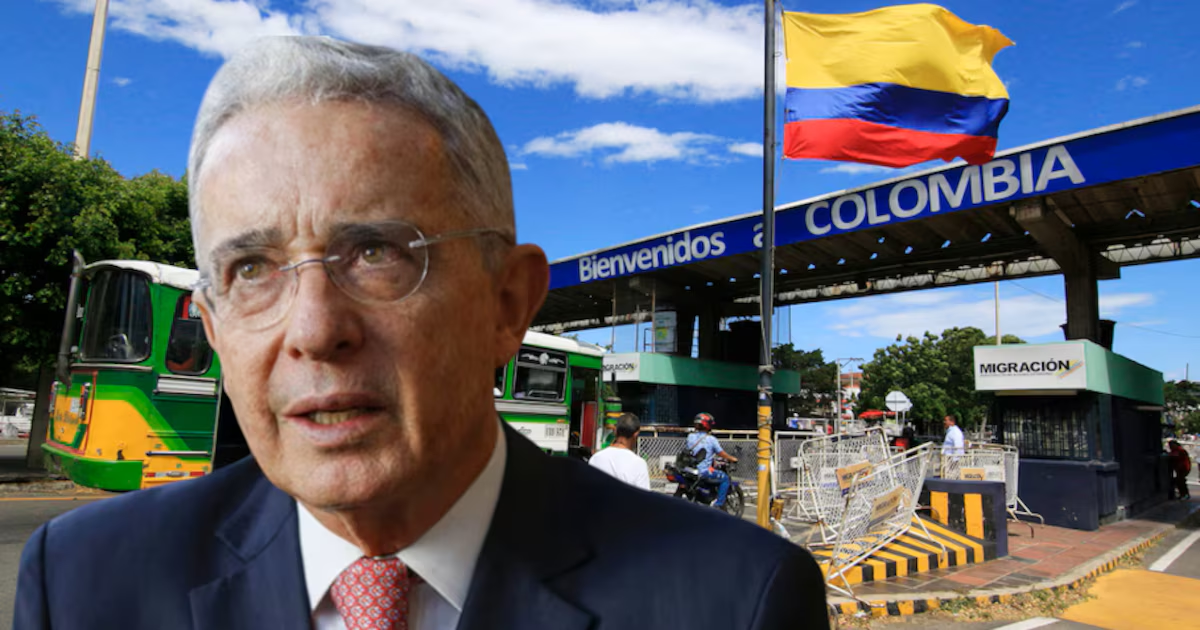
Former President Álvaro Uribe Vélez warned about the binational zone established between Colombia and Venezuela within the framework of an agreement signed during the Gustavo Petro regime. During the “Reflections on the Country” debate, Mr. Uribe said that before discussing the permanent presence of the Colombian military in its shared territory, the country must recognize and address its internal problems stemming from drug consumption and micro-trafficking.
According to Uribe, “Today, many Colombian youths have no other opportunity than to distribute drugs and earn 10, 12,000,000 pesos a month to carry out this destructive mission.In the former president’s opinion, this situation reflects the lack of effective policies against drug trafficking and the lack of political will to combat drug trafficking.
You can now follow facebook and within us WhatsApp channel
It went on to describe the regime of Nicolas Maduro as “an accomplice, founder and patron of drug cartels,” noting that this relationship makes the Venezuelan regime a legitimate military target.
Uribe pushed back against Petro’s approach of sending Colombian soldiers to the binational zone, saying it could expose the military to strategic and military risks, including the possibility of being targeted by the U.S. military due to President Maduro’s ties to drug lords.And does the Petro government want to send Colombian soldiers into the binational zone? His excuse is to defend Maduro.”.
In this sense, he asserted that “one of the first decisions that the new Colombian government must take is to exclude and abolish Colombia’s participation in the binational zone famously dominated by President Maduro’s tyranny.”

The first bilateral zone was created on July 17, 2025, when the governments of Gustavo Petro and Nicolás Maduro signed a memorandum of understanding in Caracas establishing a cooperation framework valid for five years. The document stipulates that the region includes the Venezuelan states of Tachira and Zulia, as well as the department of Norte de Santander. However, the Petro government has indicated that other states, such as La Guajira and Cesar, may also join the initiative.
The memorandum proposes that the two countries cooperate on projects related to culture, education, health, trade and other designated goods, and considers the creation of technical committees and regular meetings.. Similarly, the possibility of receiving financial support from international organizations is recognized. However, the actual scope of the agreement is conditioned by each country’s budgetary availability and the political will of local governments, and does not create any international legal obligations.
Meanwhile, in August 2025, Colombia and Venezuela signed a second memorandum of understanding to create a separate shared economic zone in the Colombian departments of Vichada and Guainía and the state of Amazonas on the Venezuelan side of the border. The agreement aims to coordinate actions in areas such as culture, education, health, commerce, sport and tourism, following a model similar to the first region of Catatumbo.

The memorandum highlights the historical and cultural connections of border populations and foresees actions in sensitive areas such as health campaigns, literacy, trade facilitation, and ecotourism.. However, project implementation is dependent on available resources and local government coordination, with limited certainty of effective implementation.
It is worth mentioning that the Constitutional Court has already admitted for consideration a lawsuit filed against the memorandum of understanding signed between the two agreements in July. The High Court ordered the submission of evidence, including official documents of the aforementioned ministries related to the signing, implementation and monitoring of the Memorandum of Understanding, as well as reports on possible commitments and obligations of the Colombian state with respect to the bilateral agreement.
On top of that, Evidence regarding the participation of the authorities in coordinating activities within the SEZ, reports on bilateral cooperation for border security, and documents allowing determination of the legal and financial scope of the agreement are required.. The purpose of this evidentiary practice is to enable the court to have complete and verifiable information with which to decide on the legality of the memorandum and its possible suspension during the examination of the claim.



